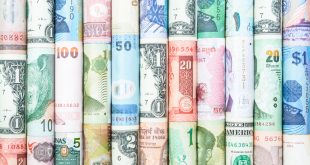Interviewed on Dubai TV on Monday, Mohammed Hashad, Head of Research and Development at Noor Capital and the member of the American Association of Technical Analysts, commented on the most important developments in the global financial markets on the first day of trading week, and most notably:
US Debt Ceiling
The main concern of most markets now is that the US debt ceiling has risen to record levels of over $32 trillion, asked how worrying it seems to the US and the world in general, Hashad pointed out that the debt ceiling crisis is actually a source of worry, but only in one case, which is the failure of the US administration to reach an agreement between the Republicans and Democrats, particularly after the United States exceeded the approved ceiling and there may be a possibility of default.
Hashad also noted that he believes, based on past history, that markets will find that after this period of conflict between the Republicans and Democratics, they could eventually agree on one way or another to raise the debt ceiling and save the United States from government shutdown.
Hashad explained that there was a default depending on several factors, the first of which is that it is not the first time that the Treasury Department asks Congress to raise the debt ceiling, and the basic idea of raising the debt is to avoid running out of liquidity for governments.
Hashad also noted that the latest remarks by US Treasury Secretary Janet Yellen last week have already begun to take some key measures in an effort to prevent the debt crisis from worsening. Thus, Hashad believes that the long history between the Republicans and Democratics undermines market fears and so, both parties could reach some sort of agreement.
Asked whether this debt crisis could play a role regarding the upcoming US interest rate decision, Hashed pointed out that the answer to this question is divided into two parts, one for fiscal policy and the other for monetary policy, but if necessary, the Fed may abandon the gradual approach to raising interest rates and start cutting interest rates directly as of its first upcoming meeting.
Asked whether the debt ceiling crisis could worsen, Hashad has ruled this out, but if there is a default on the US debt, there could be significant negative repercussions, the cost of borrowing could rise, many Americans could lose their jobs, and the dollar’s status as a safe haven currency could decline.
Oil
Amid the prevalent optimism about the Chinese economy and stricter sanctions against Russian oil, asked whether there will be possibility for crude oil to hit the $100 per barrel level, Hashad explained that markets are operating amid data, some of which are conflicting and different, so we find that oil prices are moving in the upward and downward directions, but the total trend is considered an uptrend that has already achieved weekly gains for US crude, which began to surge towards the $82 per barrel level.
WTI crude has also benefited greatly from the reopening of the Chinese economy and the lifting of lockdown restrictions as the world’s second-largest energy consumer. According to Hashad, crude oil also benefited greatly from recent statements by Saudi Arabia that it had opened a discussion with the Russian side on a plan to maintain oil prices at approved levels.
Hashad believes that the $100 level is possible, particularly in light of the gradual decline in inventories, we may see $100 per barrel, when central banks begin to slow the pace of interest rate hiking.
Gold
Asked whether the current market data indicate that gold could thrust past $2000 per ounce, Hashad said that the current data indicates the continuation of the upward trend for gold prices, given that global central banks could tend to begin to slow down the pace of raising interest rates, this could, in turn mean further surge of gold prices in the near future.
 Noor Trends News, Technical Analysis, Educational Tools and Recommendations
Noor Trends News, Technical Analysis, Educational Tools and Recommendations




